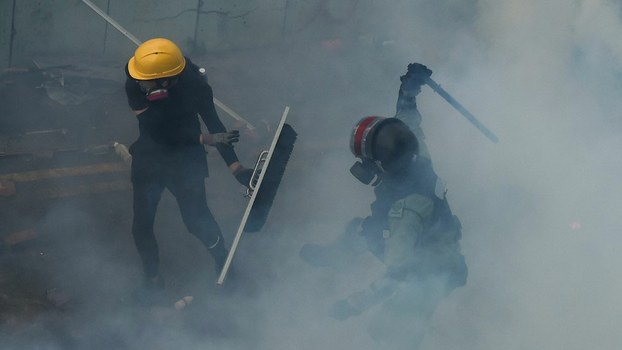Hong Kong protesters are ‘bloodied but not broken’ in the wake of abusive policing tactics for which the authorities have yet to be held accountable, according to an annual report from Amnesty International.
The report tracked a wave of youth-led protests across Asia which had defied “escalating repression and a continent-wide crackdown on freedom of expression and peaceful assembly.”
“2019 was a year of repression in Asia, but also of resistance. As governments across the continent attempt to uproot fundamental freedoms, people are fighting back – and young people are at the forefront of the struggle,” said Amnesty International’s regional director for East and Southeast Asia and the Pacific Nicholas Bequelin said.
“From students in Hong Kong leading a mass movement against growing Chinese encroachment, to students in India protesting against anti-Muslim policies; from Thailand’s young voters flocking to a new opposition party to Taiwan’s pro LGBTI-equality demonstrators. Online and offline, youth-led popular protests are challenging the established order,” he said.
It said the Hong Kong protest movement, which began in June 2019 with mass popular opposition to extradition to mainland China, had demanded accountability in spite of increasingly harsh treatment by the authorities.
“Since June, Hong Kongers have regularly taken to the streets to demand accountability in the face of abusive policing tactics that have included the wanton use of tear gas, arbitrary arrests, physical assaults and abuses in detention,” Amnesty International said in a statement launching the report.
“Police deployed reckless and indiscriminate tactics to quell peaceful protests, including torture in detention,” it said. “Demands for a proper investigation into the conduct of the security forces have yet to be met.”
It said governments in the region had tried to justify repression by demonizing their critics as pawns of “foreign forces.”
But it said protest had yielded some results, especially in Hong Kong, where the government was forced to withdraw planned changes to the city’s extradition laws.
“Yet, with no accountability for months of abuses against demonstrators, the fight goes on,” the group said.
‘Stifled, but not silenced’
Bequelin added: “Protesters across Asia in 2019 were bloodied, but not broken. They were stifled, but not silenced.”
Amnesty International’s Hong Kong director Man-kei Tam said the Hong Kong government had used violent means to suppress peaceful demonstrations from the outset.
“They didn’t pay any attention to the protesters’ demands, and they brought the police on the pretext of maintaining public order,” Tam said. “They cracked down on peaceful demonstrators and the general public, and on freedom of expression.”
Tam said the city’s government had breached the mini-constitution, the Basic Law, as well as human rights obligations under international rights treaties.
“They promised to protect Hongkongers’ right to freedom of expression and association, but they are getting more and more like mainland China, using force to crack down on any kind of dissent,” Tam said.
Hong Kong Human Rights Monitor spokeswoman Claudia Yip said the Amnesty International report should be cause for concern.
“[It shows] that the human rights situation has gotten worse very rapidly for the people of Hong Kong,” she said.
She warned that the authorities could step up the use of state security charges like sedition or subversion, possibly after enacting new legislation, to suppress people’s freedom of speech and association.

